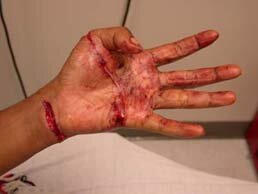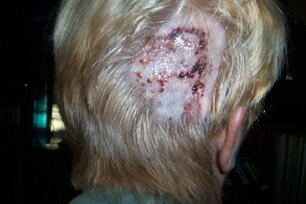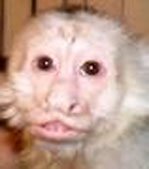|
NONHUMAN PRIMATES IN THE PRIVATE SECTOR - RISKS
Of serious concern are the safety risks posed to the community by nonhuman primates in private possession. Nonhuman primates pose safety and health risks to their possessors and any person coming into contact with them. Nonhuman primates are notorious for harboring deadly and contagious illnesses such as tuberculosis, Hepatitis, and Simian Herpes B. [Click here to read more about zoonoses acquired from 'pet' primates.]
QUICK FACTS
Importation of nonhuman primates as 'pets' is prohibited by the Canadian Food Inspection Agency and the U.S. Centers for Disease Control. The World Organization for Animal Health has a position statement against the importation of nonhuman primates as 'pets'. The American Zoological Association, the National Association of State Public Health Veterinarians and the American Society of Primatologists have position statements against private sector possession of nonhuman primates.
|
|
|
BITES FROM NONHUMAN PRIMATES CAN CAUSE SEVERE LACERATIONS
Wounds may become infected, with the potential to reach the bone and cause permanent deformity. Many reported monkey bites have resulted in serious injury to the individual who possessed the monkey/ape, to a neighbor, or to a stranger on the street.
It is estimated that for every reported monkey bite, at least ten bites go unreported.
|
The young woman whose hand is pictured here says: "I thought Kaylie was the perfect child. I bottle-raised her from infancy. She slept with me, went to do shopping errands with me and was part of the family. When she was a baby capuchin, I would never have imagined that as a three-year-old Kaylie would attack me with no warning."
"The nerves in my hand and wrist were so severely severed that I will likely never regain use of my hand despite all of the surgeries I have endured."
|

|
"Kaylie lost her life. She was euthanized by authorities. Anyone who acquires a monkey thinking it will be a suitable pet is embarking upon a tragic journey& painful and heartbreaking."
|
|
Children are especially vulnerable to being attacked since monkeys and apes are naturally inclined to establish dominance hierarchies.
|
|
This nine-year-old Montgomery County, Texas boy was playing in his yard when he was suddenly attacked by a neighbor's 'pet' macaque monkey.
Of the attack, the boy says, "The monkey started jumping. He got this arm, then he jumped to this arm and started yanking, and going back and forth to a leg and both my arms, like, taking turns on all of them." [Source: ABC 13 Eyewitness News]
|
|
|
These wounds were caused by a small female monkey which had been considered a "sweet loving pet" for eight years.
|

|
|
THE PLIGHT OF 'PET' MONKEYS
Regardless of how well-intended, there are very few people who have the knowledge and/or resources to provide captive monkeys/apes with adequate care for a lifetime. Baby monkeys/apes entered in to the 'pet' trade are robbed of the opportunity to be raised by their biological mothers, and as they mature their natural inclinations are stifled by attempts to mold them in to 'obedient pets'. When formerly dependent baby monkeys/apes reach adolescence, they begin to exhibit aggression. In accordance with their natural behaviors, monkeys/apes bite and scratch. Often, the end result is displacement (following negligent/abusive treatment, both physically and mentally) of the monkey/ape. Some monkeys/apes are condemned to living the rest of their lives alone in a cage with little or no personal contact with other living beings. Others are "sent away" because of their "bad" behaviors. Some monkeys/apes may even be euthanized by the owner.
QUICK FACTS
Many individuals who purchase exotic animals, including monkeys and apes, intending to make them in to 'pets' do not consider the following:
Exotic animals need physical and psychological enrichment; spacious and secure enclosures; companionship of conspecifics, and they have specialized dietary and nutritional needs. Depending on the species, costs associated with responsibly caring for an exotic animal can run in to thousands of dollars a year. Many insurance companies refuse home owner's coverage to those in possession of species deemed 'dangerous'. In many locales, it may be difficult or even impossible to find a veterinarian who is qualified and experienced to handle/treat exotic species. New bills/laws banning private sector possession of wild/exotic animals are being introduced/passed at unprecedented rates (many of these bills/laws do not have "grand fathering" clauses.) Unlike domestic dogs/cats, some animal species (for example, nonhuman primates) can have life-spans of 30-40 years.
|
The life for so-called 'pet' monkeys and apes is far removed from what they would experience in their natural habitat. Unfortunately, monkeys and apes have become popular in the exotic animal 'pet' trade and they are easily obtainable. A quick search on the internet alone reveals forty-eight web sites which currently specialize in selling baby monkeys and apes.
Though infant monkeys and apes (like all mammalian species) are completely dependent on their caretakers, nonhuman primates are not domesticated, and their instincts remain very much intact in captivity. Adult monkeys and apes exhibit aggression and instinctively bite and scratch. Individuals possessing primate species often attempt to change the nature of the monkey/ape rather than the nature of the care provided. Such tactics include confinement in small barren enclosures, chaining, shocking, beating "into submission," or even painful mutilations, such as tooth and nail removal.
Nonhuman primates do not make good 'pets'. They require special care, housing, diet, and maintenance that the average person cannot provide. When in the hands of private individuals monkeys and apes typically suffer due to poor care. A life in a backyard, basement or garage cage cannot even begin to meet these very social primates' instinctual needs and desires, such as seeking a mate, raising young, foraging, basking in the sun, and establishing territories. Nonhuman primates are social animals, and they need to be around their own kind for healthy mental development. Human substitutes are not enough to fill this need.
|
|
Neeko is a pigtail macaque who was confined to a small animal carrier (shown in the photo on the left) for the first 7 years of his life. The owner lived in an apartment in Dallas, Texas and feared letting Neeko out of the carrier so he fed Neeko a semi-liquid diet through a sports straw. As a result, Neeko did not have the ability to digest any solid food.
Deprived of sunlight, Neeko's skin was ghostly pale and his face was gaunt. Rarely removed from the animal carrier for brief periods of time for a diaper change, Neeko suffered from such severe urine scald that hair would not grow on the areas of his body where he was diapered.
|
|
WHERE DO BABY MONKEYS AND APES COME FROM
Baby monkeys and apes destined for the 'pet' trade are literally "pulled" away from their protective mothers when they are only hours or days old. Remember, commercial gain (not compassion) is the breeder's motivation.
The infant monkeys/apes and their biological mothers typically suffer depression from the forced separation. "Breeder" females are often purposely impregnated at a frequency which can be 4-6 times higher than the species would breed in natural circumstances, leading to serious and often fatal/crippling maladies like hemorrhaging and severe bone mass depletion. Bottom-line: purchasing an infant primate is always consumerism supporting an unscrupulous (and sometimes illegal) trade.
|
QUICK FACTS
17 U.S. states ban private sector possession of nonhuman primates and other states ban certain species and/or require a permit.
Aside from state laws, many municipalities, cities, and/or counties across the United States prohibit private possession of nonhuman primates. New laws and regulations prohibiting monkeys and apes from being kept as pets are being passed at unprecedented rates.
|
Raised by humans, the baby monkeys/apes never have the chance to develop as they should, thus they become psychologically maladjusted. They have little or no chance of leading life in accordance with their instincts as nature intended.
All things considered, it is usually a 'Lose-Lose-Lose-Win' situation when individuals acquire monkeys/apes to be 'pets'. The infant primate's biological mother loses when her baby is torn from her breast to be sold as a 'pet'. The surrogate parent often loses when the monkey/ape matures and becomes 'unmanageable'. The monkey /ape usually loses by having her/his instincts stifled; by not receiving proper care; when inappropriate harsh discipline is administered in attempts to control the nonhuman primate; and through surgical mutilation, such as tooth removal. The only "winner" in this scenario is the dealer or breeder who profited from selling the baby monkey/ape.
Like all wild animals, monkeys and apes should be living in their natural habitats, not in situations where humans attempt to force domestication on them.
Unfortunately, the "sanctuary solution" is about to run out for these owners -- the few legitimate sanctuaries for nonhuman primates in the United States are either almost at capacity, or at full capacity.
This capuchin's owner had all of his teeth surgically removed.
|
Individuals possessing primate species often attempt to change the nature of the monkey/ape rather than the nature of the care provided. Such tactics include confinement in small barren enclosures, chaining, shocking, beating "into submission," or even painful mutilations, such as tooth and nail removal.
|
|

|
|
INSTEAD OF CONTRIBUTING TO THE SUFFERING INHERENT IN THE 'PET' PRIMATE TRADE&
If you truly love primates and wish to help them, consider volunteering at a reputable primate sanctuary, or sponsor a monkey/ape in an established sanctuary. [Click here for AESOP-Project's recommended primate sanctuaries.]
There are dozens of sanctuaries across the United States which are full to the brim with "unwanted" primates who are cast-offs from the 'pet' primate trade and they require support from the public.
Don't become part of the problem. Educate yourself and your family and friends. Discourage those around you from contributing to the suffering inherent in the tragic 'pet' primate trade.
Related:
Click here to go to IPPL's article and call for letters regarding endangered primates as victims of the pet trade
Click here to go to IPPL's article 'The US Pet Monkey Trade'
Click here for more information about monkeys/apes kept as "pets"
NEW PETITION: Help stop the primate pet trade in the UK
|



